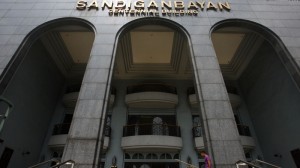Guilty of bribery, ex-judge wants justices out
MANILA, Philippines—A former Bulacan Municipal Trial Court (MTC) judge, who was sentenced by the Sandiganbayan last month to up to three years in prison for receiving P20,000 in bribe, has sought the inhibition of the justices who handled his case.
In his motion, ex-Bulacan MTC Judge Henry Domingo said he “seriously doubts” that antigraft court’s Fifth Division would be able to resolve “with fairness, justice and impartiality” his previous petition seeking a reversal of its Nov. 19 ruling.
In that resolution, the court found Domingo guilty beyond reasonable doubt of indirect bribery for demanding money from a litigant in exchange for a favorable decision.
Domingo argued that the court erred in convicting him for indirect bribery since he was actually indicted for direct bribery by the prosecution.
Violation
“(This is) all in violation of and disregard of his constitutional and procedural right to due process, and in violation of and disregard of the constitutional and procedural rights of an accused,” the former judge said in his Dec. 10 petition.
Saying the prosecution presented a “fatally defective information” against him, Domingo claimed the court tried and convicted for a crime he was not accused of committing.
Since he was not arraigned for a case of indirect bribery, the former court official said he was not given the chance to be “informed of the nature and cause” of the case.
“This Honorable Court, however, because it cannot convict (the) accused for the crime of direct bribery as charged in the fatally defective information, convicted him of the crime of indirect bribery which is not the crime charged in the fatally defective information and for which (the) accused did not present evidence,” Domingo argued.
Defective information
“The prosecution, however, maintained the information instead of amending it. Hence in the trial that ensued, accused had to confront the prosecution witnesses on the charge of direct bribery and on the basis of the information,” he said.
Domingo said the court’s decision convicting him for indirect bribery was proof that the prosecution had indeed filed a defective information against him.
Court records showed that Domingo was arrested in entrapment operation by the National Bureau of Investigation agents on Feb. 17, 2003, after receiving P10,000 cash and a check for P10,000 from Ildefonso Cuevas, who was then being tried by Domingo for falsification of public documents.
Framed
Cuevas claimed the judge asked P20,000 from him to acquit him from the criminal case.
In convicting him of indirect bribery, the antigraft court said Domingo’s claim that he was just framed was an “unsubstantiated denial (which) cannot prevail over the totality of the prosecution’s evidence.”
“The defense of frame up, just like denial and alibi, is looked with disfavor by the Supreme Court because it could be easily concocted. To substantiate the said claim, clear and convincing evidence must be presented,” the court had said.
































